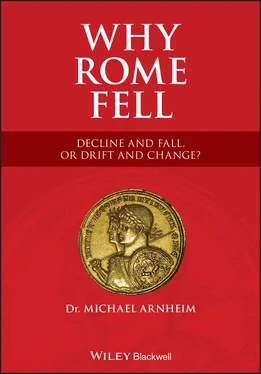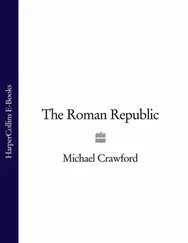Michael Arnheim - Why Rome Fell
Здесь есть возможность читать онлайн «Michael Arnheim - Why Rome Fell» — ознакомительный отрывок электронной книги совершенно бесплатно, а после прочтения отрывка купить полную версию. В некоторых случаях можно слушать аудио, скачать через торрент в формате fb2 и присутствует краткое содержание. Жанр: unrecognised, на английском языке. Описание произведения, (предисловие) а так же отзывы посетителей доступны на портале библиотеки ЛибКат.
- Название:Why Rome Fell
- Автор:
- Жанр:
- Год:неизвестен
- ISBN:нет данных
- Рейтинг книги:3 / 5. Голосов: 1
-
Избранное:Добавить в избранное
- Отзывы:
-
Ваша оценка:
- 60
- 1
- 2
- 3
- 4
- 5
Why Rome Fell: краткое содержание, описание и аннотация
Предлагаем к чтению аннотацию, описание, краткое содержание или предисловие (зависит от того, что написал сам автор книги «Why Rome Fell»). Если вы не нашли необходимую информацию о книге — напишите в комментариях, мы постараемся отыскать её.
Why Rome Fell: Decline and Fall, or Drift and Change?
Why Rome Fell
Why Rome Fell
Why Rome Fell — читать онлайн ознакомительный отрывок
Ниже представлен текст книги, разбитый по страницам. Система сохранения места последней прочитанной страницы, позволяет с удобством читать онлайн бесплатно книгу «Why Rome Fell», без необходимости каждый раз заново искать на чём Вы остановились. Поставьте закладку, и сможете в любой момент перейти на страницу, на которой закончили чтение.
Интервал:
Закладка:
The Imperial Cult
From the beginning of the Principate, there was always a tendency to revere the emperor in a religious sense. Though Augustus steadfastly refused divine honors for himself, he turned the deification of his adoptive father, Julius Caesar, to good account, styling himself divi filius (son of a god). Requests from the Greek-speaking provinces of Asia and Bithynia as early as 30 BCE to worship the future Augustus as sōter (savior) were deflected by combining this worship with that of Dea Roma (the personification of Rome as a goddess). (Cassius Dio, 51.20.6–7.) The loyalty of Roman citizens living in the provinces was to be demonstrated by worship not of the living ruler but of Dea Roma and Divus Julius. (Suetonius, Divus Augustus , 52; Tacitus, Annals , 4.37.)
The title Augustus , meaning “the sublime one,” initially used as a name, was redolent of divinity, associated as it was with Romulus, the eponymous mythical founder of Rome, who was worshiped as a god under the name of Quirinus. With a few exceptions, emperors were routinely deified upon death. Vespasian’s deathbed joke, cited in the previous chapter, “Dear me, I think I’m becoming a god,” represents a skeptical attitude towards imperial deification coupled with a recognition of it as a normal feature of Roman religion.
Sacrificial offerings were believed to propitiate the gods, and deified emperors were honored in the same way as the more established gods. The great majority of the population of the Roman Empire were not offended by the imperial cult. In the Eastern areas, particularly, there was a long tradition of worshiping even living rulers, going back well beyond their incorporation into the Roman Empire. So, the imperial cult formed a natural and integral part of the state religion.
In the West, and particularly in Italy, to avoid worshiping the living emperor, the emperor’s genius was worshiped instead. Every Roman paterfamilias (head of the family) was believed to have his own genius , which was not the same thing as his soul, but rather was his attendant spirit. As all genii were divine, they were a proper object of worship, sidestepping the worship of a living person.
But the worship even of dead emperors was anathema to both Jews and Christians, who abhorred it as the worship of a graven image or idolatry, categorically prohibited in the Ten Commandments. It is sometimes suggested that the Jews were given special exemption from participation in the imperial cult. This does not appear to be correct, but Jews were certainly dispensed from the sacrificial duties associated with the cult, being allowed to substitute for it prayers for the emperor’s well-being instead. (See Momigliano 1987.) The Jews could be recognized as a separate nation and so could normally enjoy the same toleration for their religion as was normally accorded by the Roman state religion to other communal religions. (See below.) But Christians did not form any distinct national, communal, or social element within the Empire. As far as the Roman authorities were concerned, Christians were simply members of Roman society, and their refusal to participate in the imperial cult, an integral part of the Roman state religion, could be regarded as seditious. So, the persecution of Christianity, a much rarer occurrence than is commonly believed (see below), was not motivated by any disagreement over doctrine, creed, or belief but was purely political.
The Great Persecution
Diocletian’s persecution of the Christians, formalized by an edict issued in 303, was no exception to this rule. Eusebius, the Church historian, admitted that there was no persecution of Christianity in the early part of the reign. (Eus. HE 8.1.1-6.) And Diocletian’s ire was first directed (in 302) only against the Manichees (Manicheans), a Christian sect with a good deal of support in the Eastern part of the Empire as well as in Egypt and North Africa. The Manichees were suspected of forming a pro-Persian fifth column, important at a time when a revived Persian Empire under the Sasanians posed a major threat to the Roman Empire.
But what was Diocletian’s motive for then turning on the mainstream Christians? It had nothing to do with religious dogma or belief but was a response to Christian refusal to serve in the army or, once enlisted, to participate in the sacrificial ceremonials of the imperial cult.
The thorough research of Professor Candida Moss has revealed the falsity of the age-old Christian tradition that Christians had been mercilessly and systematically hunted down, persecuted, and executed by the Romans for 300 years until this was halted by Constantine. Candida Moss puts the Great Pesecution in context in a passage quoted in Chapter 10. (Moss 2013, p. 129.)
Why does this matter? It is important in relation to Constantine’s later favoring of Christianity. (See Chapters 3and 10.) In fact, the “pagan” religions of the Ancient world, including the old Roman state religion, were normally tolerant of one another. They were “communal religions”, a term I coined in my books Is Christianity True? (1984), The God Book (2015) and God Without Religion (2018). This term meant that a person’s religious identity was automatically bound up with their national, social or communal identity. Belief, dogma, or creed did not come into it. Unlike Christianity, which is a “creed religion” (another term I coined), communal religions mostly had no definite beliefs, only ceremonial and rituals. It was taken for granted that every nation had its own religion and its own gods, so one would respect foreign religions. Rome was exceptional in being (by ancient standards) a huge cosmopolis that attracted people from all over the Empire and beyond. These people brought their religions with them, so there were numerous foreign cults with their own gods, priests, and temples active in Rome. On the communal principle, these were generally tolerated even though a number of them had long been separated from their communal roots and were simply what are sometimes described by modern writers as “oriental mystery cults.”
Foreign cults, such as those of Isis, Cybele (the Magna Mater , or Great Mother), and Mithras (an all-male cult, very popular in the Roman army) were all welcomed in Rome. Cf. Peter Garnsey’s remark, discussed in Chapter 10, that the Roman religion was “…disposed to expand or absorb or at least neutralize” them. If that were so, why were these religions allowed to flourish with their own temples and their own priests at the heart of the Roman Empire? It was not under the Roman pagan religion but under Christianity that they were closed down and, especially after 391, banned, with the destruction of many varied pagan temples, statues, and images and the murder of a number of pagan priests. (See Chapter 10.)
Julian on Augustus and Diocletian
In Julian’s satirical sketch, De Caesaribus (“The Caesars”), penned in December 361, the Emperor Julian (r. 361–363), Constantine’s nephew, draws a marked contrast between Augustus and Diocletian. Here, first, is his portrait of Augustus, whom he calls Octavian, presumably because “Augustus” would have been confusing because it was a standard title borne by emperors from the time of the original Augustus down to his own day and by Julian himself:
Octavian entered, changing color continually, like a chameleon, turning now pale, now red; one moment his expression was gloomy, sombre, and overcast, the next he unbent and showed all the charms of Aphrodite and the Graces. Moreover, in the glances of his eyes, he was fain to resemble mighty Helios, for he preferred that none who approached should be able to meet his gaze. “Good Heavens!” exclaimed Silenus, “what a changeable monster is this! What mischief will he do us?” “Cease trifling,” said Apollo, “after I have handed him over to Zeno here, I shall transform him for you straightaway to gold without alloy. Come, Zeno,” he cried, “take charge of my nursling.” Zeno obeyed, and thereupon, by reciting over Octavian a few of his doctrines, in the fashion of those who mutter the incantations of Zamolxis, he made him wise and temperate. (Julian, Caes . 307, tr. Wright (1913) attalus.org/translate/caesars.html.))
Читать дальшеИнтервал:
Закладка:
Похожие книги на «Why Rome Fell»
Представляем Вашему вниманию похожие книги на «Why Rome Fell» списком для выбора. Мы отобрали схожую по названию и смыслу литературу в надежде предоставить читателям больше вариантов отыскать новые, интересные, ещё непрочитанные произведения.
Обсуждение, отзывы о книге «Why Rome Fell» и просто собственные мнения читателей. Оставьте ваши комментарии, напишите, что Вы думаете о произведении, его смысле или главных героях. Укажите что конкретно понравилось, а что нет, и почему Вы так считаете.












